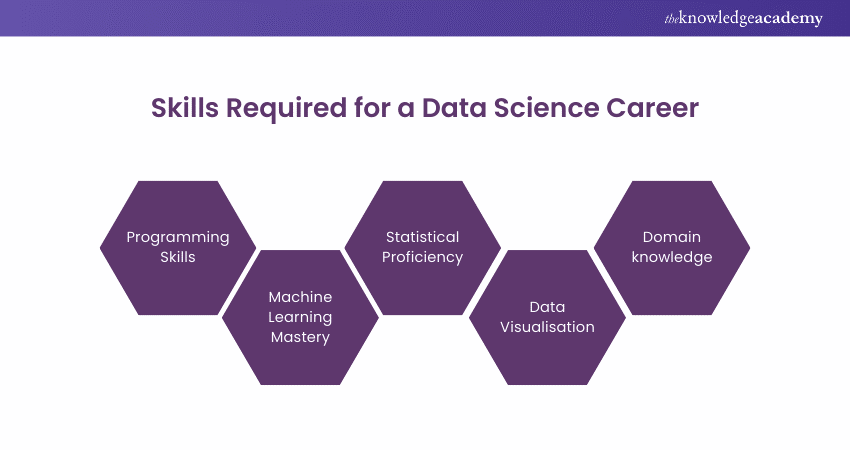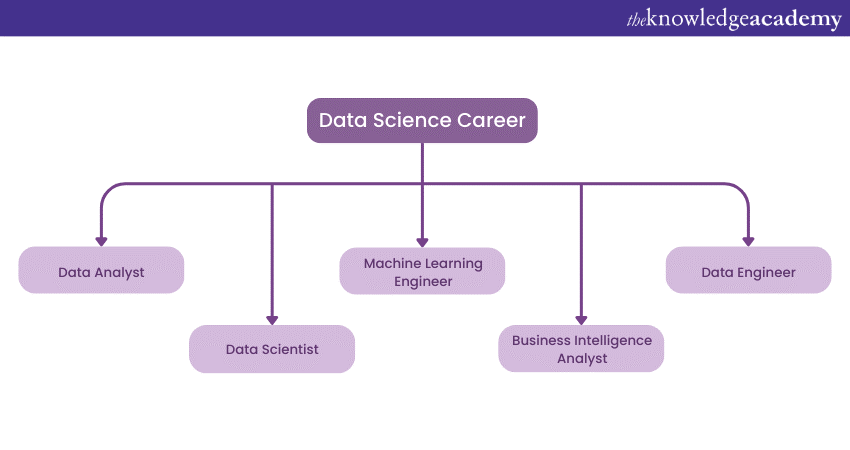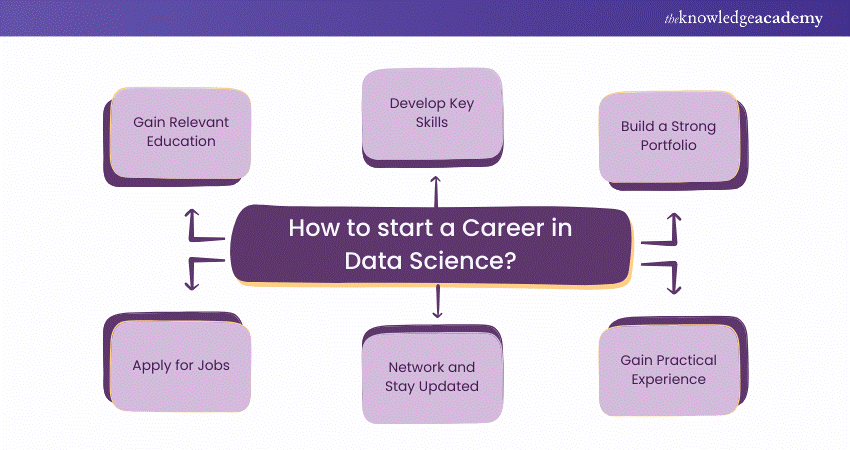We may not have the course you’re looking for. If you enquire or give us a call on +918037244591 and speak to our training experts, we may still be able to help with your training requirements.
We ensure quality, budget-alignment, and timely delivery by our expert instructors.

Our world today is completely driven by Data, and Data Science is the cornerstone of this data-centric era. Due to this, the demand for Data Science professionals is at an all-time high. Data Science Career has become highly sought after with the progress of technology as the fame of Artificial Intelligence (AI) keeps rising.
So, for individuals who are fascinated by data or considering possible Careers in Data Science, it’s time to get familiar with the prospective Career opportunities in the field. Read this comprehensive blog on Data Science Careers to explore the fundamental concepts, from its Career paths, average salaries, skills or roles.
Table of Contents
1) What is Data Science?
2) Skills Required for a Data Science Career
3) Why Choose a Data Science Career?
4) Types of Data Scientist
5) Responsibilities of a Data Scientist
6) Qualifications Required to Become a Data Scientist
7) Data Science Career Pathways
8) How to Start a Career in Data Science?
9) Salary of a Data Scientist
10) Conclusion
What is Data Science?
Data Science is all about digging through complicated data to find helpful insights to guide decisions. It includes managing, cleaning, and interpreting data using statistics, programming, and Machine Learning tools and techniques. The goal is to spot trends, patterns, and connections that can help solve problems, make predictions, and boost results in various fields.
At its heart, Data Science seeks to convert raw data into useful information that helps businesses make intelligent choices and spark creativity. It’s commonly used in healthcare, finance, marketing, and retail to enhance services, streamline operations, and create personalised experiences.
By tapping into their data, institutions can get ahead of the competition, work more efficiently, and push innovation in their offerings
Skills Required for a Data Science Career
Achieving excellence in Data Science as a Career necessitates a combination of technical proficiency and soft skills. Staying abreast of emerging Data Science Trends is crucial for Data Scientists to remain competitive and effectively contribute to the evolving field. Some of the skills include:

1) Programming Skills: Learning programming languages such as Python and R is essential for Data Science. These languages are used to handle and analyse data and build machine learning models.
2) Machine Learning Mastery: An in-depth knowledge of Machine Learning algorithms is indispensable. Data Scientists rely on this expertise to develop predictive models, automate decision-making, and unearth valuable patterns within data.
3) Statistical Proficiency: A solid foundation in statistics is crucial for a Data Science Career. Understanding statistical concepts empowers Data Scientists to draw meaningful insights, validate hypotheses, and drive data-informed decision-making.
4) Data Visualisation: Data Visualisation skills are crucial for clearly presenting complex findings. Tools like Matplotlib, Seaborn, and Tableau help Data Scientists turn raw data into easy-to-understand visual stories, making them accessible to everyone, whether they are technical or not.
5) Domain Knowledge: A deep understanding of the specific industry or field you work in is vital. Domain knowledge equips Data Scientists to pose pertinent questions, interpret results within a context, and devise tailored solutions for sector-specific challenges.
Why Choose a Data Science Career?
The Careers in Data Science open the door to a world of compelling rewards. Some benefits that come with choosing Data Science as your profession, emphasising why it's a path worth considering, are as follows:
1) High Demand: Data Science is currently in high demand, and it's unlikely that this trend will slow down anytime soon. Businesses and organisations hunger for professionals who can navigate and interpret vast datasets in this data-driven world. This translates into abundant job opportunities for those skilled in this field.
2) Competitive Salaries: Data Science is known for its competitive compensation packages. The unique blend of specialised skills and the ability to extract invaluable insights from data often results in attractive remuneration for Data Scientists. For example, the following table shows how a Data Scientist’s salary differs across regions worldwide:
|
Country |
Average salary |
|
United Kingdom |
GBP 53,000 |
|
United States |
USD 131,000 |
|
United Arab Emirates |
AED 180,000 |
|
Singapore |
SGD 96,000 |
|
Australia |
AUD 161,000 |
|
Canada |
CAD 131,000 |
|
India |
INR 12,88,691 |
Source: Glassdoor
3) Diverse Applications: Data Science isn't confined to a single industry; it's a universal toolkit. Its applications span across numerous fields, including healthcare, finance, e-commerce, marketing, and more. This versatility allows you to shape your Data Science career around your interests and passions, and explore exciting Data Science Business Ideas that align with various industries.
4) Meaningful Impact: Data Science provides a platform to make a meaningful impact. Data Scientists play a pivotal role in informed decision-making, complex problem-solving, and driving innovation by deriving actionable insights from data. Whether improving healthcare, enhancing customer experiences, or optimising supply chains, data-driven solutions can potentially effect positive change.
Learn to create arrays from Python lists with our Python Data Science Course – Join today!
Types of Data Scientist
Data Scientists work across various industries, including:
a) Finance: Analysing market trends, risks, and investment strategies using statistical models and machine learning.
b) Academia: Supporting research by interpreting large datasets and modelling complex phenomena.
c) Scientific Research: Applying data analysis to genomics, climate science, and physics to drive discoveries.
d) Healthcare: Creating predictive models for patient outcomes, medical image analysis, and optimising healthcare operations.
e) Retail: Enhancing customer experience, personalising marketing, and optimising supply chains using purchasing and feedback data.
f) Information Technology: Improving system performance, cybersecurity, and infrastructure through data analysis.
g) Government: By analysing demographic and economic data, government supports policy-making, urban planning, and public services.
h) E-commerce: Optimising customer segmentation, recommendations, and pricing strategies to drive sales and conversions.
Responsibilities of a Data Scientist
Responsibilities of a Data Scientist include:
a) Collaborating with business teams to identify issues and propose data-driven solutions for decision-making.
b) Developing algorithms and experiments to merge, manage, and extract data, providing tailored reports to colleagues, customers, or the broader organisation.
c) Assessing and improving data collection methods and evaluating data sources.
d) Communicating findings verbally and in writing to convey insights and recommendations.
e) Creating reports that tell compelling stories about customer behaviour and business interactions.
f) Researching to develop prototypes and proof of concepts.
g) Identifying opportunities to apply insights across different departments (e.g., HR, marketing).
h) Maintaining curiosity and enthusiasm for solving problems through algorithms and inspiring others to see the value in data science.
In senior roles, you will also:
a) Define and oversee the organisation’s data science strategy.
b) Establish and optimise data systems and processes.
c) Evaluate emerging technologies and represent the company at conferences.
d) Build relationships with clients and stakeholders.
Qualifications Required to Become a Data Scientist
To pursue a career as a data scientist, you typically need a computer science, mathematical, or science-based degree. Relevant degree subjects include:
a) Computer Science
b) Data Science (or Computer and Data Science)
c) Engineering
d) Mathematics
e) Mathematics and Operational Research
f) Physics
g) Statistics
Proficiency in programming languages like R, Python, SQL, C, or Java is essential, along with robust database design and coding skills.
Alternatively, you may pursue a Data Science graduate training scheme offered by large employers. These programs typically last around two years, though they are highly competitive. Some schemes accept graduates from any discipline, while others may have specific degree requirements.
Data Science Career Pathways
The field of Data Science presents numerous Career pathways, each tailored to distinct interests and skill sets. Some of these Data Science Roles are discussed below:

Data Analyst
Data Analysts collect, process, and analyse statistical data to help companies improve their business outcomes. They transform data sets into meaningful forms, such as reports or presentations, and provide insights and recommendations based on the data. They may work with different types of data, such as consumer behaviour, financial performance, or operational efficiency, depending on the industry.
Data Analysts need to be proficient in R, Python, HTML, C/C++ and SQL. They are usually entry-level positions in the Data Science field, but they offer great opportunities for learning and Career advancement.
Machine Learning Engineer
Machine Learning Engineers build predictive systems using Machine Learning models. They use programming languages like Python to implement algorithms that can learn from data. They have a deep knowledge of Machine Learning algorithms and techniques, which enables them to create sophisticated models that can perform tasks such as data classification, outcome prediction, or decision automation.
Machine Learning Engineers develop solutions for various domains, such as recommendation systems, Natural Language Processing (NLP), image recognition, and more. They turn raw data into useful insights, driving the AI-powered technologies that are becoming more common in today’s world.
Data Engineer
Data Engineers create and manage data pipelines, which are the essential channels for data flow within an organisation. These pipelines are the backbone of the Data Science Pipeline, ensuring that data is efficiently collected, stored, and retrieved in a fast and secure way. Data Engineers have expertise in Big Data technologies such as Spark, Hadoop, and SQL databases. They build the infrastructure that Data Scientists and Analysts rely on to perform analysis and build models, forming a critical foundation for the entire data science process.
Data Engineers also play a key role in setting up data warehouses and Extract, Transform, and Load (ETL) processes to transform data into a ready-to-analyse format. Their work supports the organisation’s data ecosystem. , enabling the successful execution of various Data Engineering Projects.
Business Intelligence Analyst
Business Intelligence Analysts translate data into insights that inform business strategies. They use tools like Tableau, Power BI, or QlikView to create dashboards and reports that show an organisation’s performance. Business Intelligence Analysts collaborate with stakeholders from different departments, such as marketing, finance, and operations, to deliver data-driven insights.
They support organisations in making smart decisions by finding trends, patterns, and opportunities within the data. Their work helps executives and managers to adapt to changing business situations, leading to better decision-making processes.
Data Scientist
Data Scientists are not the same as Data Analysts, even though the latter covers a broader range of data-related roles. Data Scientists are expected to be proficient in mathematics, computer science, and business strategy, along with expertise in Behavioural Data Science, enabling them to apply insights from various disciplines effectively.
Data Scientists also need to balance their involvement in both the Information Technology (IT) and the business domains, which makes them highly sought-after. These professionals, like many other data roles, require a mix of analytics, Machine Learning, data mining, and statistical skills, as well as knowledge of algorithms and coding, all of which can be effectively supported by powerful laptops for Data Science.
Data Scientists are also familiar with these programs: R, SAS, Python, Matlab, SQL, Hive, Pig, and Spark. Moreover, a good Data Scientist can communicate the meaning and implications of data in a clear and simple way to others.
Preparing for a data science role? Study the most frequently asked Data Science Interview Questions to ensure you're ready to tackle any challenge in your upcoming interview.
How to Start a Career in Data Science?
Starting a Career in Data Science involves gaining the right education and developing key skills. Here are the essential steps to help you begin your journey in this exciting field.

a) Gain Relevant Education: Start by obtaining a degree in computer science, statistics, or mathematics. Many universities now offer specialised programs in Data Science. Additionally, online courses and certifications can provide valuable knowledge and skills.
b) Develop Key Skills: Learn essential skills like programming (Python, R), data manipulation, and Statistical Analysis. Familiarise yourself with Data Visualisation tools and machine learning techniques. Practical experience with real data sets is crucial.
c) Build a Strong Portfolio: Work on projects that showcase your Data Science abilities. Participate in competitions, contribute to open-source projects, or create your own Data Analysis projects. A strong portfolio demonstrates your skills to potential employers.
d) Gain Practical Experience: Look for internships or part-time jobs to gain hands-on experience. Real-world experience is invaluable in understanding how to apply Data Science techniques to solve actual problems.
e) Network and Stay Updated: Join Data Science communities, attend conferences, and connect with professionals. Networking can provide insights into industry trends. Stay updated with the developments and technologies in Data Science.
f) Apply for Jobs: With your education, skills, portfolio, and experience, start applying for Data Science positions. Customise your resume to highlight your relevant skills and experiences. Ensure to showcase your understanding of Linear Algebra for Data Science as it is often a critical topic in Data Analysis interviews, especially when discussing optimization techniques and model performance.
Learn the various roles of a Data Scientist with our Data Science and Blockchain Training – Join today!
Salary of a Data Scientist
Salaries for data scientists vary based on experience, qualifications, and sector, but typical the salary range in the UK are as follows:
a) Junior Data Scientists: Starting salaries range from £25,000 to £30,000, increasing to around £40,000 with more experience.
b) Mid-level Data Scientists: With a few years of experience, salaries typically range from £40,000 to £60,000.
c) Lead/Chief Data Scientists: Senior roles can command salaries upwards of £60,000, with some reaching over £100,000.
d) Contract Data Scientists: Those working on short-term projects typically earn between £450 and £500 per day.
In addition to base salaries, benefits may include company pension schemes, flexible or remote working options, performance bonuses, and private medical insurance.
Conclusion
A Data Science Career offers immense potential for personal fulfilment and professional reward. This path empowers individuals to extract invaluable insights from data, driving innovation across diverse industries. Understanding the Data Science Lifecycle is crucial in navigating this field, as it outlines the key stages involved in transforming raw data into meaningful insights. Whether you're a novice or a seasoned professional, we hope that this blog equips you with the essentials for a successful journey.
Learn to communicate data insights with our Data Science with R Training – Join today!
Frequently Asked Questions
Is it Hard to Get a Data Science Job?

Securing a data science job can be competitive due to high demand and technical requirements. However, with relevant skills, experience, and a solid portfolio, you can improve your chances of landing a position in this field.
What are the Other Resources and Offers Provided by The Knowledge Academy?

The Knowledge Academy takes global learning to new heights, offering over 3,000 online courses across 490+ locations in 190+ countries. This expansive reach ensures accessibility and convenience for learners worldwide.
Alongside our diverse Online Course Catalogue, encompassing 19 major categories, we go the extra mile by providing a plethora of free educational Online Resources like News updates, Blogs, videos, webinars, and interview questions. Tailoring learning experiences further, professionals can maximise value with customisable Course Bundles of TKA.
What is The Knowledge Pass, and How Does it Work?

The Knowledge Academy’s Knowledge Pass, a prepaid voucher, adds another layer of flexibility, allowing course bookings over a 12-month period. Join us on a journey where education knows no bounds.
What are Related Courses and Blogs Provided by The Knowledge Academy?

The Knowledge Academy offers various Data Science Courses, including Python Data Science, Data Science with R Training and Predictive Analytics Course. These courses cater to different skill levels, providing comprehensive insights into Types of Data in Statistics.
Our Data, Analytics & AI blogs covers a range of topics related to Data Science, offering valuable resources, best practices, and industry insights. Whether you are a beginner or looking to advance your Data Science skills, The Knowledge Academy's diverse courses and informative blogs have you covered.
Upcoming Data, Analytics & AI Resources Batches & Dates
Date
 Data Science Analytics
Data Science Analytics
Fri 25th Apr 2025
Fri 20th Jun 2025
Fri 22nd Aug 2025
Fri 17th Oct 2025
Fri 19th Dec 2025






 Top Rated Course
Top Rated Course



 If you wish to make any changes to your course, please
If you wish to make any changes to your course, please


